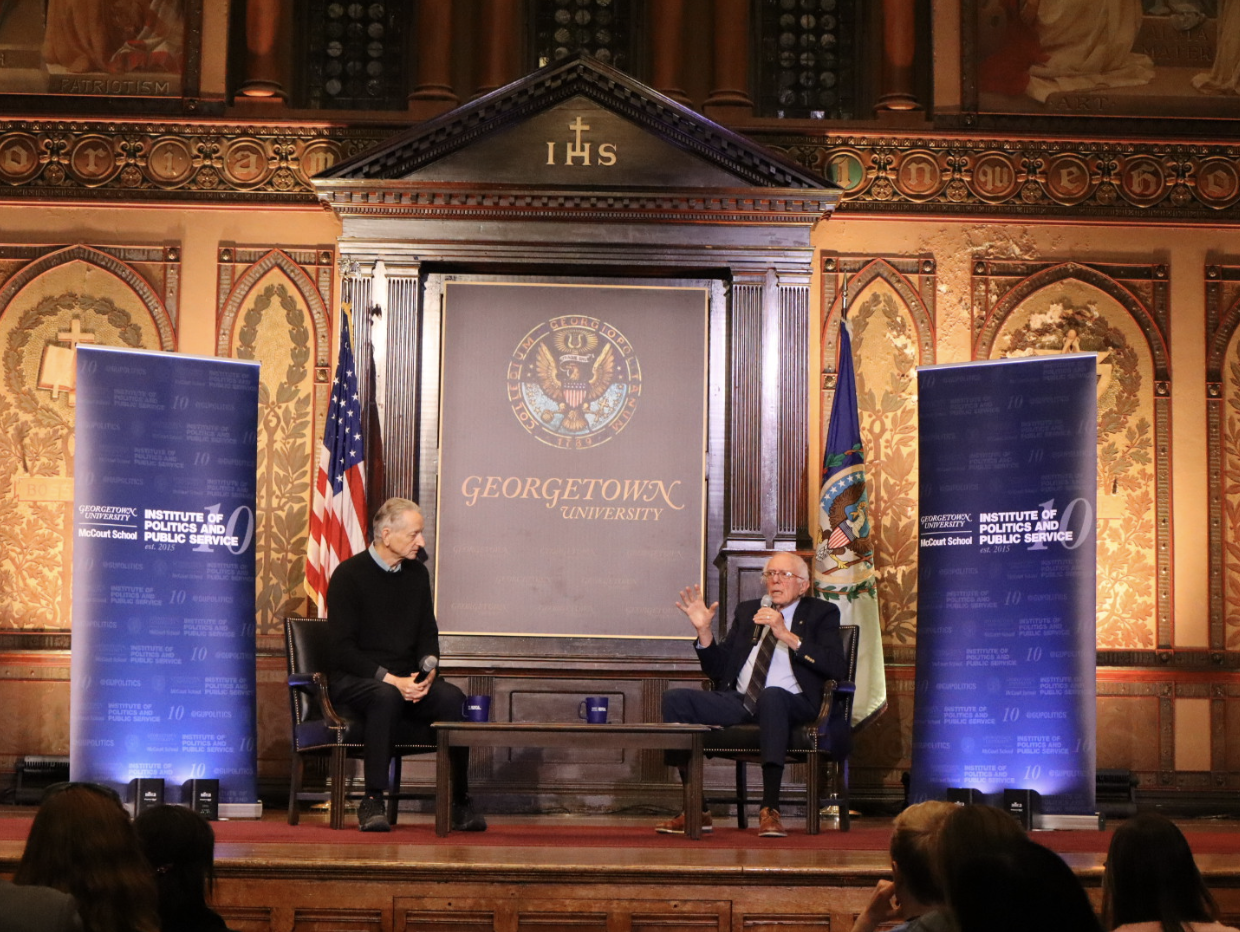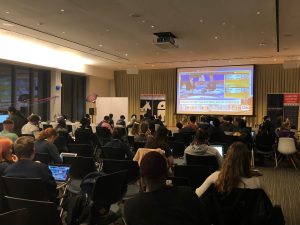Sen. Bernie Sanders (I-Vt.) sat down with Nobel Prize Laureate Geoffrey Hinton to discuss the future of artificial intelligence (AI) in Gaston Hall on Nov. 18.
As the Georgetown University Institute of Politics and Public Service (GU Politics) celebrates its tenth anniversary this fall, the organization is looking ahead to the future of public service after a decade of political disruption, according to Executive Director Mo Elleithee (SFS ’94). Sanders and Hinton discussed how AI is a critical component of this conversation.
As a graduating senior, GU Politics Advisory Board member Catherine McGuire (SFS ’26) felt the conversation was especially relevant for those getting ready to begin their professional careers.
“[GU Politics] is trying to focus on what the future of careers in politics and public service look like, now more than ever,” McGuire said. “I think AI is on everyone’s minds. Especially as a senior who’s looking at the job market, who wakes up everyday and reads another article about how graduating seniors are screwed, particularly because of AI.”
While others like McGuire may be thinking about the future of AI, Sanders acknowledged that there is still a lack of conversation about both AI’s danger and potential.
“AI robotics are going to have a very profound, transformative impact on our country and the entire world,” Sanders said. “But despite that reality, we are not hearing the kinds of discussion we need in Congress, in the media, and within American society about what this consequential change is about and how we address it.”
He asked Hinton, who is commonly referred to as “the Godfather of AI” for his contribution to the development of artificial neural networks, a series of questions about the technology’s future.
Hinton and Sanders commented on the likeliness of mass unemployment, expressed their concern for reliance on AI chatbots for companionship, and considered the future of war amongst robotic armies. When nations can wage wars exclusively with technology, the potential loss of human life no longer serves as an incentive for maintaining peace, Hinton said.
Hinton also called attention to the debated role of AI in education.
“A person using AI can still do critical thinking or they can try and dump everything on the AI,” Hinton said. “But I think we should not try to exclude AI’s systems because that’s the future. What universities have to encourage is people using AI well.”
Hinton and Sanders acknowledged the political potential of AI to create a more equitable future.
“You are living in the richest country in the history of the world,” Sanders said. “If we had a rational system designed to improve the life of all people, there are extraordinary things that we could be doing.”
Sanders emphasized that AI has the potential to personalize education, expand healthcare access, and aid a transition to cleaner energy systems.
It is unlikely that AI will be used to serve that agenda, Sanders said. He explained that some of the wealthiest people in the world, including Elon Musk and Jeff Bezos, are investing billions of dollars in AI.
“They are not staying up at night worrying about working people,” Sanders said. “In my view, they want even more wealth and they want even more power. So the struggle is not whether AI is good or bad, it is who controls it and who benefits from it.”
Calla O’Neil (SFS ’26), another GU Politics Advisory Board member, found it impactful to have a politician like Sanders, who focuses on issues like education and healthcare, leading the conversation about this “cross-cutting issue.”
O’Neil found herself most interested in the way that Hinton and Sanders reframed the conversation, shifting the emphasis from AI itself to those in power who govern it.
“I think it’s a really interesting lens to look at, rather than just comparing the pros and cons, actually understanding what are the intentions of those who have the most power in creating and governing these technologies and then where those benefits are being distributed,” O’Neil said.
AI is both a “terrifying” and “exciting” development in technology and policy, audience member Taylor Moses (CAS ’27) said.
“Hinton offered so many different perspectives on AI,” Moses said. “People usually talk about AI like it is going to end the world or it’s going to save the world and he proposed so many of his own ideas and introduced us to all of the different ways that we can look at this ‘intimidating black cloud.’”







